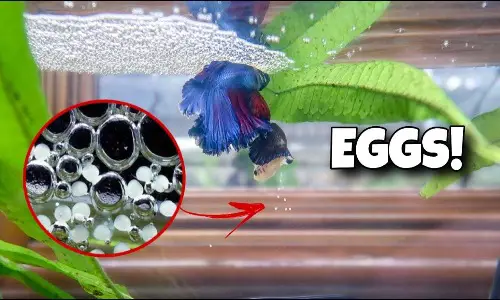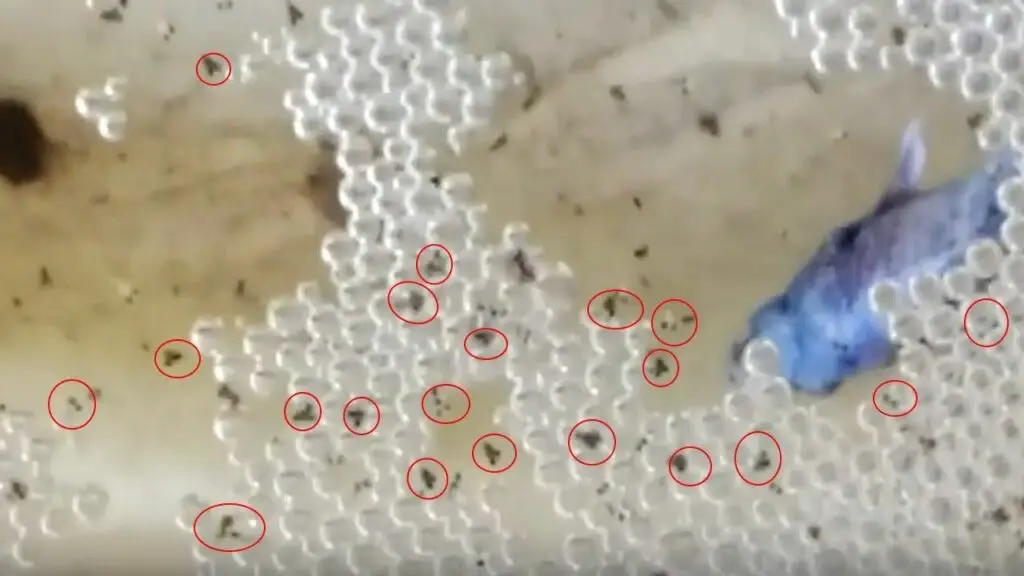Last Updated on 10 months by admin
Betta fish are known for their striking colors and long, flowing fins. But did you know that these beautiful fish start their lives as tiny eggs? Hatching betta fish eggs can be an exciting experience for any fish enthusiast, but it requires patience and careful attention to detail.
In this article, we’ll take a closer look at the process of hatching betta fish eggs, from preparing the breeding tank to caring for the newly hatched fry. Whether you’re a seasoned betta fish breeder or just starting out, there’s plenty to learn about this fascinating aspect of the betta fish life cycle.

All About Betta Fish Eggs Hatching
Betta fish, also known as Siamese fighting fish, are one of the most popular pet fish in the world. They are known for their vibrant colors, long fins, and aggressive behavior. If you are a betta fish owner or enthusiast, you may be interested in breeding your bettas. One of the most exciting parts of betta breeding is watching the eggs hatch. In this article, we will discuss all you need to know about betta fish eggs hatching.
Understanding Betta Fish Breeding
Before we dive into the details of betta fish eggs hatching, let’s first understand a bit about betta fish breeding. Betta fish are anabantids, which means they have a specialized breathing structure called a labyrinth organ, which allows them to breathe air from the surface of the water. Breeding betta fish requires a male and female betta to be placed in the same tank. The male will build a bubble nest on the surface of the water, and the female will lay eggs in the nest. The male will then fertilize the eggs and tend to the nest until the fry hatch.
Breeding betta fish takes some preparation and patience. You will need to have a separate breeding tank, proper water conditions, and the right diet for your fish. Once you have prepared your breeding tank and introduced your male and female bettas, you can watch their courtship and breeding behavior.
Preparing for Betta Fish Eggs Hatching
Once the male has fertilized the eggs and built a bubble nest, you can expect the eggs to hatch within 24 to 48 hours. It’s essential to prepare for the hatching process by ensuring that the water conditions are optimal for the fry’s survival. The water temperature should be around 80 degrees Fahrenheit, and the pH level should be between 6.5 and 7.5.
You should also ensure that the breeding tank has plenty of hiding places for the fry, such as live plants or small caves. It’s crucial to keep the tank clean and free of any debris that could harm the fry. You can use a siphon to remove any uneaten food or waste from the tank.
Watching Betta Fish Eggs Hatching
Watching betta fish eggs hatch is an exciting and rewarding experience. Once the eggs hatch, the fry will be small and transparent, with tiny tails and yolk sacs attached to their bodies. The fry will swim to the surface of the water to take their first breath of air.
The male betta will continue to tend to the fry, keeping them in the bubble nest and guarding them from any potential threats. The fry will begin to develop their fins and coloration over the next few weeks.
Feeding Betta Fish Fry
Feeding betta fish fry can be a bit challenging, as they are tiny and require specific food. You can feed them newly hatched brine shrimp or commercially available fry food. It’s crucial to feed them small amounts frequently throughout the day, as they have small stomachs.
It’s also essential to keep the water clean and free of any uneaten food or waste. You can use a turkey baster or pipette to remove any excess food from the tank.
Caring for Betta Fish Fry
Caring for betta fish fry requires patience and attention to detail. You will need to monitor the water conditions and ensure that the fry are getting the right nutrition. As they grow, you may need to separate them into larger tanks to prevent overcrowding.
It’s essential to keep the tank clean and free of any debris that could harm the fry. You can use a sponge filter or air stone to create gentle water movement and promote healthy oxygenation.
Betta Fish Eggs Hatching Benefits
Breeding betta fish and watching their eggs hatch can be a rewarding experience for many reasons. It allows you to witness the miracle of life and learn more about these fascinating fish. It can also be a way to share your love of bettas with others by sharing or selling your fry.
Breeding bettas can also help preserve the species and prevent inbreeding. It’s essential to research the genetic history of your bettas and avoid breeding related fish to prevent genetic defects.
Betta Fish Eggs Hatching Vs. Buying Fry
Breeding betta fish and hatching their eggs can be a more cost-effective way to obtain fry than purchasing them from a pet store or breeder. It also allows you to have more control over the fry’s genetics and upbringing.
However, breeding bettas requires more preparation, time, and attention than purchasing fry. It’s also essential to have a plan for what you will do with the fry once they hatch, as overcrowding can lead to stress and disease.
Conclusion
Betta fish eggs hatching is a fascinating and rewarding experience for betta fish enthusiasts. By understanding the breeding process and preparing for the hatching process, you can watch your betta fry grow and thrive. It’s essential to provide the right water conditions, nutrition, and care for the fry to promote their health and survival. Breeding betta fish can be a way to share your love of these beautiful fish with others and preserve the species for future generations.
Freequently Asked Questions
In this section, we will answer some frequently asked questions about Betta Fish Eggs Hatching. Betta fish are popular among fish-keeping enthusiasts, and hatching their eggs can be a rewarding experience. However, it requires proper knowledge and equipment to ensure the survival of the fry.
What is the process of Betta fish eggs hatching?
The process of Betta fish eggs hatching is a delicate one. It starts with the male Betta fish building a bubble nest at the water surface to house the eggs. The female Betta fish lays the eggs, and the male fertilizes them. The male Betta then collects the eggs and places them in the bubble nest. The eggs hatch in 24-48 hours, and the fry remain in the bubble nest for another 2-3 days until they become free-swimming.
During this time, it is crucial to maintain the water temperature and quality, as well as providing the fry with appropriate food. Once the fry becomes free-swimming, they can be separated from the male Betta into their own tank to continue their growth and development.
How can I ensure the survival of Betta fish fry after hatching?
Ensuring the survival of Betta fish fry after hatching requires proper equipment and care. The fry need to be in a separate tank with a filter, heater, and appropriate water parameters. The water temperature should be around 80°F, and the pH should be between 7.0-7.5. The fry also need to be fed small and frequent meals of live or frozen baby brine shrimp or commercial fry food.
It is essential to perform regular water changes to maintain water quality and prevent the buildup of harmful toxins. Additionally, providing hiding spots, such as plants or caves, can help reduce stress and increase the chances of survival for the fry.
What are some common problems that can occur during Betta fish egg hatching?
Some common problems that can occur during Betta fish egg hatching include the male Betta fish not building a proper bubble nest, the eggs not being fertilized, or the fry dying shortly after hatching. These problems can be caused by various factors, such as improper water conditions, poor nutrition, or genetics.
To prevent these problems, it is crucial to maintain proper water conditions, provide the male Betta with appropriate nutrition, and select healthy breeding pairs. It is also recommended to research and educate oneself on Betta fish breeding and hatching before attempting it.
Can I hatch Betta fish eggs without a male Betta?
No, it is not possible to hatch Betta fish eggs without a male Betta. The male Betta is responsible for building the bubble nest, fertilizing the eggs, and caring for the fry. Attempting to hatch Betta fish eggs without a male Betta will result in the eggs not hatching and eventually deteriorating.
It is also important to note that breeding Betta fish should only be done by experienced and knowledgeable fish keepers. Breeding Betta fish without proper knowledge and equipment can result in harm to the fish and their offspring.
How long does it take for Betta fish fry to reach adulthood?
The time it takes for Betta fish fry to reach adulthood depends on various factors, such as water conditions, nutrition, and genetics. On average, it takes Betta fish fry around 3-4 months to reach sexual maturity and adulthood.
During this time, it is important to provide the fry with appropriate nutrition and care to ensure healthy growth and development. Betta fish can live up to 3-5 years in captivity with proper care and maintenance.

Betta Fish Eggs Hatching (From 0 to 7 Days)
In conclusion, hatching Betta fish eggs can be a rewarding and exciting experience for any fish enthusiast. It requires patience, dedication, and attention to detail, but the end result is worth it. Watching the tiny fry grow and develop into beautiful adult fish is a truly remarkable experience.
To ensure success in hatching Betta fish eggs, it is important to provide the proper environment and care for the eggs. This includes maintaining a consistent temperature, providing adequate oxygenation, and feeding the fry with nutritious foods.
Overall, hatching Betta fish eggs is a fascinating process that allows us to witness the miracle of life firsthand. With the right preparation and care, anyone can successfully hatch and raise their own Betta fish fry.
